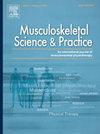立即行动--脊柱的严重病变受到健康不平等的影响
IF 2.2
3区 医学
Q1 REHABILITATION
引用次数: 0
摘要
严重脊柱病变的早期诊断是优化患者预后的关键,然而早期诊断可能会受到健康不平等的不利影响。在本文中,我们将探讨健康不平等对严重脊柱肌肉骨骼(MSK)病变的发病率和治疗效果的影响。围绕一系列因素,人们可能会经历健康不平等。这些因素包括社会经济因素、人们生活的环境条件、种族等受保护特征以及无家可归者等被社会排斥的群体。这些因素会影响人们面临的健康风险和过上健康生活的机会。一个人的行为是决定其健康状况的关键因素。高危 "健康行为包括吸烟、不良饮食、酗酒和缺乏锻炼,在这些群体中更为常见。重要的是,社会经济因素与健康行为相结合,会影响一个人可能经历的健康不平等。贫困、教育、就业、环境和饮食风气是影响 MSK 健康状况最重要的社会和经济因素。这些健康决定因素不仅使生活在贫困中的人更容易在年轻时患上良性的 MSK 病症,并导致更坏的结果,而且也是更严重的 MSK 病症的风险因素。本文章由计算机程序翻译,如有差异,请以英文原文为准。
Act now - serious pathology of the spine is affected by health inequalities
Early diagnosis of serious spinal pathology is the key to optimise patient outcomes, yet early diagnosis can be adversely affected by health inequalities. In this paper we consider the impact of health inequalities on the incidence and outcome for serious spinal musculoskeletal (MSK) pathologies. Health inequalities can be experienced by people grouped around a range of factors. These include socio-economic factors, the environmental conditions in which people live, protected characteristics such as ethnicity, and socially excluded groups such as people who are homeless. These factors can affect people's exposure to health risks and their opportunities to lead healthy lives. A person's behaviour is a key determinant of their health status. ‘Risky’ health behaviours include smoking, poor diet, harmful alcohol consumption and lack of exercise, and are more common in these groups. Importantly, socio-economic factors combined with health behaviours influence the health inequalities a person may experience. The most significant social and economic factors influencing poor MSK health are poverty, education, employment, environment, and food ethos. These determinants of health not only predispose people living in deprivation to having benign MSK conditions at a younger age and with worse outcomes, they are also risk factors of more serious MSK pathologies.
求助全文
通过发布文献求助,成功后即可免费获取论文全文。
去求助
来源期刊

Musculoskeletal Science and Practice
Health Professions-Physical Therapy, Sports Therapy and Rehabilitation
CiteScore
4.10
自引率
8.70%
发文量
152
审稿时长
48 days
期刊介绍:
Musculoskeletal Science & Practice, international journal of musculoskeletal physiotherapy, is a peer-reviewed international journal (previously Manual Therapy), publishing high quality original research, review and Masterclass articles that contribute to improving the clinical understanding of appropriate care processes for musculoskeletal disorders. The journal publishes articles that influence or add to the body of evidence on diagnostic and therapeutic processes, patient centered care, guidelines for musculoskeletal therapeutics and theoretical models that support developments in assessment, diagnosis, clinical reasoning and interventions.
 求助内容:
求助内容: 应助结果提醒方式:
应助结果提醒方式:


